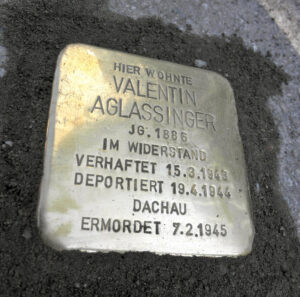Valentin AGLASSINGER, born on 14 February 1886 in St. Pantaleon, district of Braunau am Inn, was a railwayman and politician in the once independent municipality of Gnigl, which had a Social Democratic mayor from 1922 to 1934: Christian Laserer, who was also a railwayman.
Valentin AGLASSINGER, who lived with his wife Anna in Gnigl, Turnerstraße 10 (corner of Wüstenrotstraße), was an active trade unionist and Social Democrat, chairman of his local Gnigl group and a member of the Gnigl municipal council until the Social Democratic Labour Party was banned in February 1934.
Under Austrofascism, AGLASSINGER belonged to the resistance group »Revolutionary Socialists of Austria« (RSÖ), which was recognised by the police. Under the National Socialist regime, he was therefore considered to be »politically incriminated«, which is why the Gestapo had him observed.
It is also documented that Valentin AGLASSINGER was arrested by the Gestapo on 15 March 1943 – one year after the »Revolutionary Socialists« led by Engelbert WEISS were crushed in Salzburg – and charged with »preparation for high treason«.
In court, Valentin AGLASSINGER claimed not to have been a member of a resistance group, but that he had donated money to sick and distressed colleagues at work. It seems that the court believed him, as his trial ended with an acquittal on 19 January 1944. 1
The Gestapo disregarded the court’s acquittal and had Valentin AGLASSINGER, who had been detained in the police prison, deported to Dachau concentration camp on 19 April 1944.
Valentin AGLASSINGER was murdered in Dachau on 7 February 1945, shortly before his 59th birthday. His wife Anna then received a cynical message from the concentration camp commandant’s office in Salzburg: »I offer you my condolences for this loss.«
In 1947, two years after the liberation of Salzburg, his wife Anna died. In the same year, a street in the Gnigl district was named after Valentin AGLASSINGER.
Sources
- Archives of the Diocese of Linz and the Archdiocese of Salzburg: Matriculation books
- Salzburg City and Provincial Archives: civil register, victim welfare files
- Arolsen Archives: Death certificate
- Dachau Concentration Camp Memorial: Communication 11/5/2009
- Resistance and Persecution in Salzburg 1934-1945, Volume 1, Vienna 1991, pp. 284, 298-300, 610
Translation: DeepL
Stumbling Stone
Laid 23.03.2012 at Salzburg, Turnerstraße 10 (Ecke Wüstenrotstraße)



